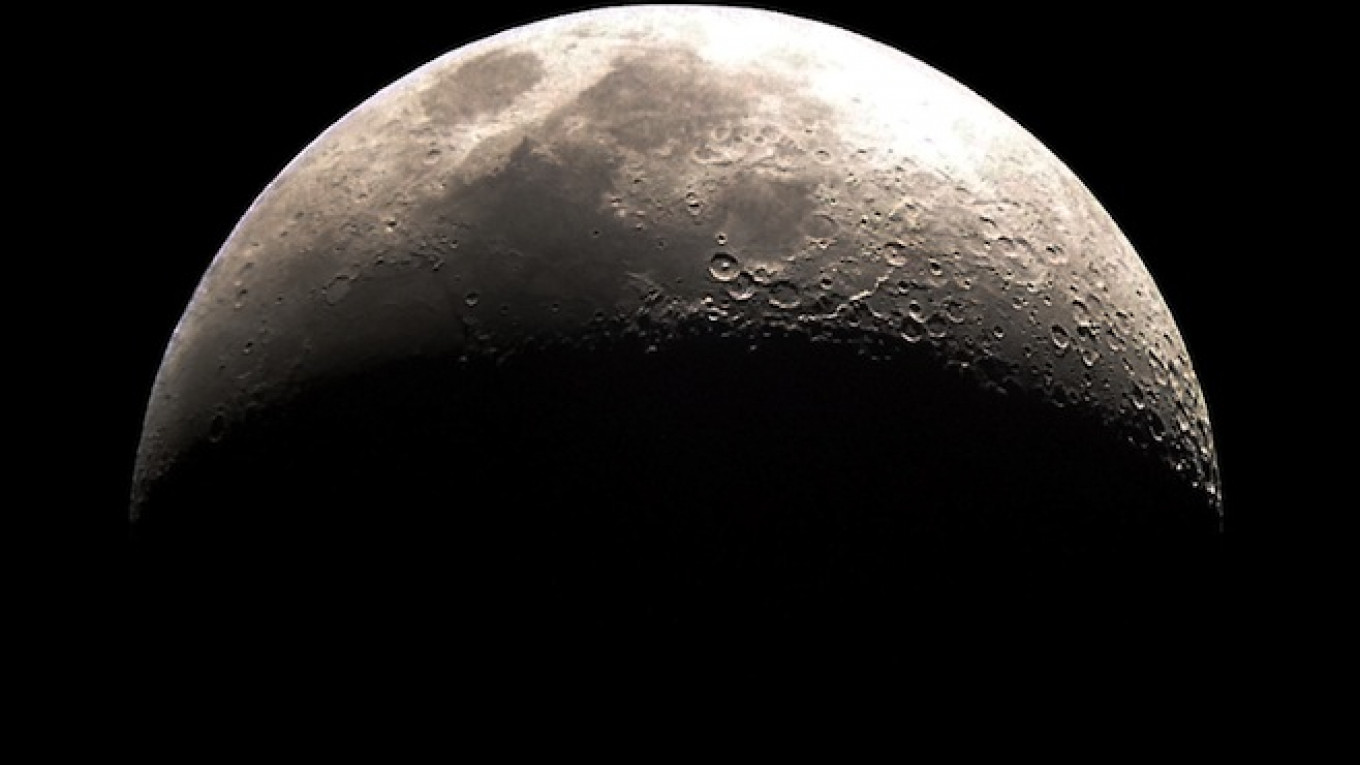Russia's federal space agency on Wednesday sent six intrepid women on a simulated eight-day flight to the moon as part of a small-scale repeat of previous isolation experiments designed to shed light on how crews of astronauts will handle long flights into deep space.
Chosen from a candidate pool of 10 Russian scientists, the six women will pretend to be the crew of a moon-bound spacecraft known as Luna-2015 for over a week while scientists at the Russian Institute of Biomedical Problems (IMBP) evaluate their physical and mental condition.
“The timing is not fictional,” the Roscosmos space agency wrote in a statement on its Facebook page Tuesday. Russia's largest space company, RSC Energia, “carried out all necessary [time] calculations,” it said.
Their mission will simulate several stages of a flight to the moon, from launch to lunar orbit to return to earth — a similar mission profile to the one used by NASA's Apollo moon landings during the late 1960s and early 1970s.
But whereas the NASA moon missions left scientists with a clear understanding of how a man's body reacts to the rigors of long-distance spaceflight, the Roscosmos mission has been pitched as a first step in discovering how female bodies will react.
The scientific supervisor to the project, Sergei Ponomaryov, was quoted by news agency RIA Novosti on Wednesday as saying women have received little attention from the field of space biology, calling it a “big omission.”
The main objective of the mission will be to study how the body adapts to the conditions of spaceflight, including the physical and psychological effects of isolation.
The six women “launched” from the IMBP at 11:00 a.m. Moscow time on Wednesday, and will spend their time aboard the Luna-2015 pretend spacecraft conducting a scientific program of about 30 experiments, according to Roscosmos.
“One of the tasks is to test and prepare a series of experiments that will subsequently be conducted aboard the International Space Station, as well as to test equipment that will be delivered to the station in the near future,” the Roscosmos statement said.
The Luna-2015 experiment is a small-scale repeat of a series of 500-day experiments conducted by the IMBP from 2007 to 2011, in which three crews were isolated in a mock-up spacecraft simulating a mission to Mars to study the psychological effects of the trip.
The news of the six-woman simulated mission to the moon followed an announcement by RSC Energia CEO Vladimir Solntsev on Tuesday that “a [Russian] manned flight to the moon and a lunar landing is planned for 2029.”
As the door to their mock spacecraft was closed on Wednesday morning, an employee of the IMBP was quoted by RIA as instructing the six women to avoid conflict with each other and “to protect the [spacecraft], and if something is broken, fix it.”
The crew consists of Yelena Luchitskaya, a senior researcher at the IMBP, and Darya Komissarova, Polina Kuznetsova, Anna Kussmaul, Inna Nosikova, and Tatyana Shiguyeva. The ages of the crew was not specified, but photos show a group of women in their 20s and 30s.
The women were selected after being evaluated over a two-month period to ensure they had the physical and psychological “right stuff” to be locked up in isolation for eight days.
This should not be a story of “six housewives in one kitchen,” the women were advised, reflecting the sort of casual sexism that continues to permeate Russia's space program, and society at large.
Only last year did Russia send its first female astronaut, Yelena Serova, to the International Space Station — making her Russia's fourth female astronaut. Meanwhile, the U.S. space agency NASA has launched over 40 women into space as part of its manned spaceflight program.
In a pre-launch press conference last year, Serova was asked questions about how she would take care of her hair in low-gravity, and if she would miss her children — to which she batted back “aren't you interested in my colleagues' hair?” and explained that Skype will allow her to stay in contact with her family, the same way her male colleagues did.
Contact the author at [email protected]
A Message from The Moscow Times:
Dear readers,
We are facing unprecedented challenges. Russia's Prosecutor General's Office has designated The Moscow Times as an "undesirable" organization, criminalizing our work and putting our staff at risk of prosecution. This follows our earlier unjust labeling as a "foreign agent."
These actions are direct attempts to silence independent journalism in Russia. The authorities claim our work "discredits the decisions of the Russian leadership." We see things differently: we strive to provide accurate, unbiased reporting on Russia.
We, the journalists of The Moscow Times, refuse to be silenced. But to continue our work, we need your help.
Your support, no matter how small, makes a world of difference. If you can, please support us monthly starting from just $2. It's quick to set up, and every contribution makes a significant impact.
By supporting The Moscow Times, you're defending open, independent journalism in the face of repression. Thank you for standing with us.
Remind me later.


